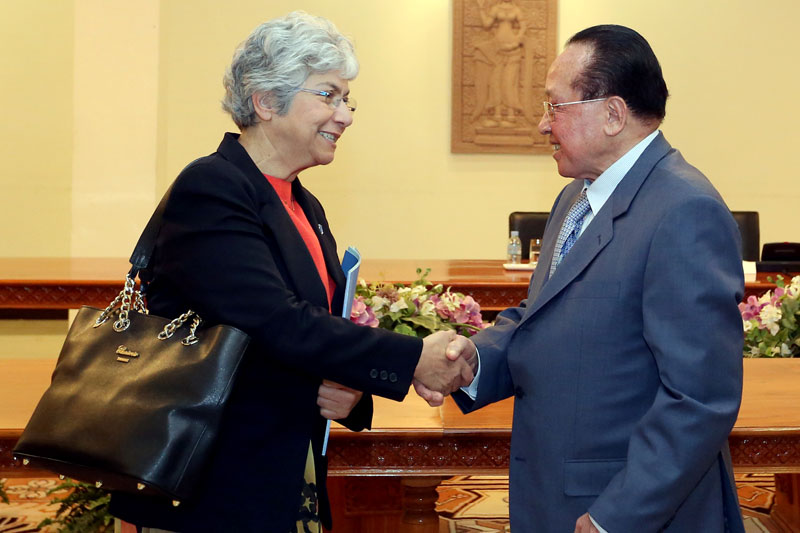The government has agreed “in principle” to resettle asylum seekers currently being detained by Australia on the South Pacific island nation Nauru, an official at the Foreign Affairs Ministry said Tuesday, with a senior official at the U.N.’s human rights program saying that the organization could provide support to the scheme.
Ouch Borith, secretary of state at the ministry, said after a meeting between Foreign Affairs Minister Hor Namhong and Flavia Pansieri, the U.N. deputy high commissioner for human rights, that the details of the agreement are now being worked out.

“This case is currently being studied, as the Royal Government has created a special committee in to study Australia’s request,” Mr. Borith told reporters.
“In short, the Royal Government has not yet given the OK, but has agreed in principle, which means we still consider and study,” he explained.
“And we will do this in accordance with international standards because the important thing is that it is voluntary and not by force.”
Mr. Borith also denied that the sticking point in the agreement was how much money the Australian government would give Cambodia to accept refugees.
“For Cambodia, this is just humanitarian policy,” Mr. Borith said.
Koy Kuong, spokesman for the Ministry of Foreign Affairs, declined to provide further information Tuesday about the committee or the status of its work.
“Regarding that issue, I have no further information at all,” he said.
Kerri Griffiths, spokesperson for Australian Immigration Minister Scott Morrison, said she could also not provide further information about the pending deal.
“Australia has no further update on the status of our discussions with Cambodia than what was provided by the Minister after his recent visit to Phnom Penh,” Ms. Griffiths said via email, referring to a trip to Cambodia by Mr. Morrison on April 3.
“The Government is continuing its discussions on these issues and welcomes the receptive and positive response from Cambodia that has been provided to date.”
Mr. Morrison said in an interview with the Australian Broadcasting Corporation on April 10 that his government was nearing a deal that would see the asylum seekers currently detained on Nauru resettled in Cambodia.
He said at the time that about 60 refugees being held at the controversial facility on Nauru would have their claims assessed every month, and that the assessments would begin sometime in May. There were 1,177 refugees detained at the Nauru detention center as of Saturday, according to Australian government figures.
“Resettlement is about freedom from persecution, it’s not a ticket to a first-class economy,” Mr. Morrison said of the prospect of sending refugees to be resettled in Cambodia.
His April 3 visit to Phnom Penh had been to follow up on Australian Foreign Minister Julie Bishop’s trip on February 22. During that visit, Ms. Bishop raised with Prime Minister Hun Sen the idea of Cambodia taking the refugees.
Ms. Pansieri, the visiting U.N. Deputy High Commissioner for Human Rights, said at her own press conference after meeting with Mr. Namhong at the Foreign Affairs Ministry on Tuesday that the U.N. would be willing to provide support for such a resettlement deal between Australia, Nauru and Cambodia.
“I have too few elements at this stage to be able to make any firm statements,” Ms. Pansieri said when asked of her opinion of the pending deal.
“What we think is important is to note that Cambodia is well aware of its international commitments to human rights standards, keen to abide by them, and to the extent there is any need for cooperation, we stand ready provide support to ensure that standards are met,” she said.
In 2011, the UN shut its refugee office in Cambodia and handed over processing duties to the government, which has in the past been heavily criticized for its handling of Uighur asylum seekers.
On Thursday, the U.N. High Commissioner for Refugees’ senior regional protection adviser, Tom Vargas, criticized the planned resettlement at a regional conference on refugees held in Jakarta.
“From our point of view, resettlement is looking for durable solutions for refugees…who have had to flee their homes,” Mr. Vargas said at the meeting.
“A real solution is not to send them to a country that is still recovering from a horrible civil war that killed millions of its people,” he said.
“It’s not in the spirit of resettlement as far as I can tell.”



